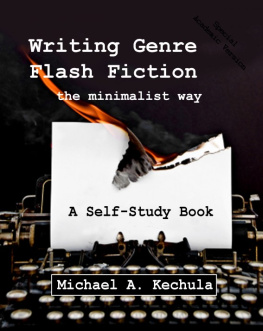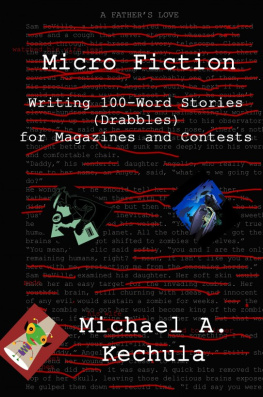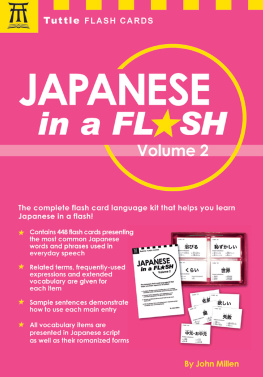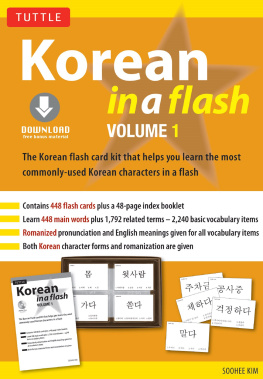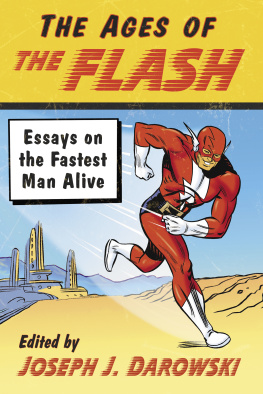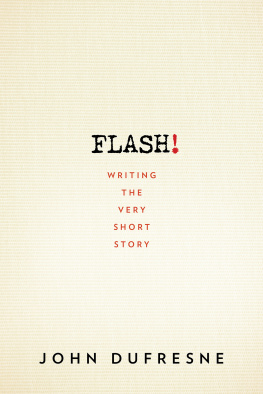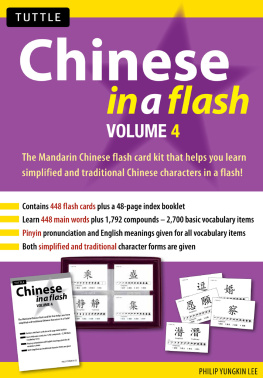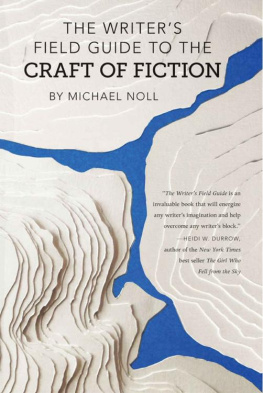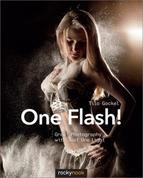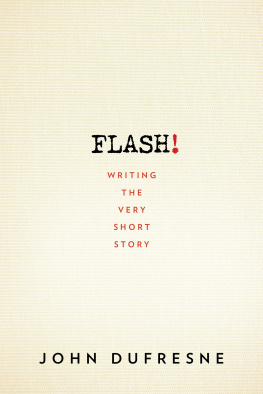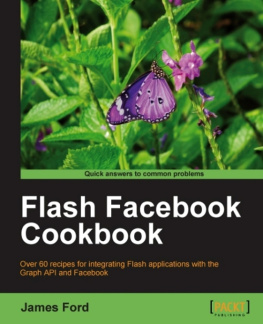Writing Genre Flash Fiction
WRITING GENRE FLASHFICTION
THE MINIMALIST WAY
A SELF-STUDY BOOK
Michael A. Kechula
Published by
BooksForABuck.com
At Smashwords
Copyright 2010 by Michael A. Kechula
This ebook is licensed for yourpersonal enjoyment only. This ebook may not be re-sold or givenaway to other people. If you would like to share this book withanother person, please purchase an additional copy for each personyou share it with. If youre reading this book and did not purchaseit, or it was not purchased for your use only, then you shouldreturn to Smashwords.com and purchase your own copy. Thank you forrespecting the hard work of this author.
ABOUT THIS BOOK
Welcome. The purpose of this book is to teachyou how to develop genre flash fiction the minimalist way. Thecontents are based on what we taught dozens of novelists and shortstory authors when we transformed them into genre flashwriters.
In a few moments, well define flash fiction,genre fiction, and the minimalist approach to developing flash.Before we do, heres how well proceed with the lessons. First,well tell you something and show some examples. Then well ask youquestions. All questions begin with Q followed by a number. Manyinvolve word reduction writing exercises. Have a pencil and paperon hand to answer the questions and complete the exercises.
Answers to all questions and exercises appearin the Answer Pages at the back of the book.
Also included is a 50 question Word ReductionExercise to give you more practice in writing tighter sentences.Answers for the questions appear in the Word Reduction AnswerPages, which appear at the back of the book.
The book contains 10 lessons. We suggest youreview Lesson-1, and Lesson-2 first. Then you may review the restin any sequence. The lesson names and page numbers are listed inthe menu on the next page.
To save space from this point forward, welluse the abbreviation FF to mean flash fiction.
This concludes the introduction. The nextpage shows the lesson Menu.
MENU
LESSON
1: INTRODUCTION TO GENRE FLASH FICTON
2: GENRE FF DEVELOPMENT PROCESS
3: WRITING OPENING SENTENCES THE MINIMALISTWAY
4: WRITING DIALOG THE MINIMALIST WAY
5: WORD-WASTERS IN DIALOG
6: WORD-WASTERS IN NARRATIVE PART-1
7: WORD-WASTERS IN NARRATIVE PART-2
8: WORD-WASTERS IN NARRATIVE PART-3
9: WORD-WASTERS IN NARRATIVE PART-4
10: WORD-WASTERS IN NARRATIVE PART-5
WORD REDUCTION EXERCISE
ANSWER PAGES FOR LESSONS
ANSWER PAGES FOR WORD REDUCTION EXERCISES
LESSON-1: INTRODUCTION TO GENRE FLASHFICTION
This lesson covers the following:
Definition of FF
Characteristics of the ideal genre FFtale
Definition of genre fiction
Genre names
Objectives of the minimalist way of writingFF
Key minimalist authoring techniques
Definition of word-wasters
List of word-wasters
DEFINITION OF FLASH FICTION: a completestory told in 1,000 words or less.
Notice we said acomplete storyand that it must be told in 1,000 words or less.
The severe word count limitation of flashcontrasts sharply with short stories that consist of 1,000 to10,000 words, and even more so with novels that range from 40,000upward. But theres another and greater difference that impactsauthors: flash is not developed using the same techniques forwriting short stories and novels. That means authors will have tolearn and apply new ones. Some flash techniques will even conflictwith those authors use to develop novels and short stories. Heresan example: when writing FF from the minimalist approach, we omitsimiles. These figures of speech are never vital to the plot in FFstories, plus they burn up precious word count. Further, some areso poorly conceived they draw attention to themselves and throw usout of the story. This has happened hundreds of times while we wereanalyzing and critiquing more than 6,000 FF stories.
If youre an author of short stories ornovels, we ask you to suspend any preconceived notions you haveabout developing genre FF. If you can do this, your transformationinto a FF writer will be much easier.
Q01: Whats the maximum number of wordsallowable in a FF tale? __________
Q02: How does the word count available inflash compare to that of short stories and novels? ShortStories_____________ Novels________________________
Q03: When developing flash, we said youshould omit________________________
Q04: Give one reason for doing that?
Q05: What did we say about similes and howthey affect the plot of a flash tale?
CHARACTERISTICS OF THE IDEAL GENRE FFSTORY
The ideal genre FF tale has the followingcharacteristics:
It should tell a complete story that can beread in 5 minutes or less.
It should have an opener that pulls readersinto the story.
It should be plot-driven.
It should emphasize telling over showing.
It should be a fast read.
It should always move forward at a briskpace.
It should be free of inflated prose.
It should be free of trivial details.
It should be free of distractions that canthrow readers out of the story.
It should contain dialog.
It should contain a maximum of 4characters.
It should contain a maximum of 4 scenes.
It should end in a way that makes itcomplete.
Q06: List at least 6 characteristics of theideal genre flash fiction story.
DEFINITION OF GENRE FICTION
Heres a dictionary description of genre,when applied to fiction: a category of fiction characterized bya particular style, form or content.
Heres a partial list of genre names:
Crime
Mystery
Romance
Speculative
Thriller
War
Western
To see more genre names, access Google andenter: fiction genres
Each of the genres listed above are furtherdivided into subgenres. For example, two subgenres of fantasy aremagical realism and urban fantasy. To obtain a full list of, say,fantasy subgenres, Google on: fantasy subgenres.
Q07: Genre fiction is characterized by aparticular style, form, or ____________
Q08: List 3 of the genre names.
The FF format works for any genre. However,the genre in greatest demand by publishers is speculative fiction.Speculative fiction is an umbrella term for sci-fi, fantasy, andhorror, as well as their dozens of subgenres.
The most compelling genre fiction tales havea protagonist with a quest, and one or more antagonists who do allthey can to prevent him from attaining the object of the quest.Crime tales are a good example. Romance tales can also have theseelements of genre fiction. Same with adventure, fantasy, and evenhumorous stories. The trick is to make all this happen in 1,000words or less.
Heres a summary of what we covered sofar:
Definition of FF
Definition of genre fiction
Characteristics of the ideal genre FFtale
Genre fiction names
Lets move on to the objectives of theminimalist way of developing genre FF fiction.
OBJECTIVES OF THE MINIMALIST WAY
The objectives of the minimalist approach towriting genre FF are: to tell as much story as possible, in as fewwords as possible, without sacrificing a smooth read.
These objectives will affect how youll beginyour story, how youll develop narrative and dialog, and how youlledit the results before submitting to magazines, anthologies, orcontests.
Q09: What are the objectives of theminimalist approach to developing FF?
Lets look more closely at the implicationsof these objectives. Were already constrained by a rule that sayswe only have 1,000 words to tell a story. Thats difficult enoughfor any author. Now it might seem as if were making things eventougher by asking you be stingy with words. What were asking youto do is adapt 4 minimalist techniques to meet the objectives,which are:
Next page
